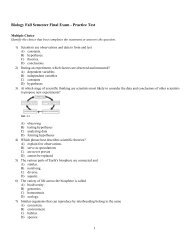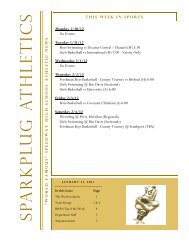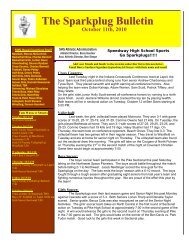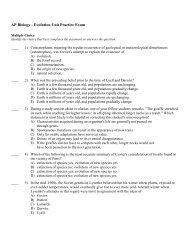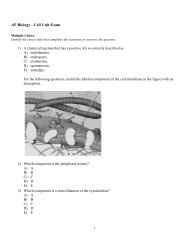2013-2014 Curriculum Guide (PDF - Printable) - Speedway High ...
2013-2014 Curriculum Guide (PDF - Printable) - Speedway High ...
2013-2014 Curriculum Guide (PDF - Printable) - Speedway High ...
You also want an ePaper? Increase the reach of your titles
YUMPU automatically turns print PDFs into web optimized ePapers that Google loves.
INTRODUCTION TO ENGINEERING DESIGN<br />
Grade Level 9 – 12<br />
NOTE: The content of this course is very similar to two previously offered courses: Tech Systems and<br />
Manufacturing. Consequently, students with credit for either Tech Systems or Manufacturing should not enroll in<br />
Introduction to Engineering Design.<br />
Introduction to Engineering Design is an introductory course which develops student problem solving skills using<br />
the design process. Students document their progress of solutions as they move through the design process.<br />
Students develop solutions using elements of design and manufacturability concepts. They develop hand sketches<br />
using 2D and 3D drawing techniques. Computer Aided Design (CAD). This course is being offered for the first<br />
time in the <strong>2013</strong>-14 school year. Beginning in the fall of <strong>2014</strong>, this course will become the prerequisite for the<br />
Principles in Engineering course.<br />
PRINCIPLES OF ENGINEERING<br />
Grade Level 10 - 12<br />
Principles of Engineering is a course that focuses on the process of applying engineering, technological, scientific<br />
and mathematical principles in the design, production, and operation of products, structures, and systems. This is a<br />
hands-on course designed to provide students interested in engineering careers to explore experiences related to<br />
specialized fields such as civil, mechanical, and materials engineering. Students will engage in research,<br />
development, planning, design, production, and project management to simulate a career in engineering. The topics<br />
of ethics and the impacts of engineering decisions are also addressed. Classroom activities are organized to allow<br />
students to work in teams and use modern technological processes, computers, CAD software, and production<br />
systems in developing and presenting solutions to engineering problems.<br />
Prerequisite for <strong>2013</strong>-14: Students must have completed two semesters of coursework in the Industrial<br />
Technology Department prior to enrolling in this course. Starting with the <strong>2014</strong>-15 school year: The prerequisite<br />
will be completion of the Introduction to Engineering Design course (which is being taught for the first time during<br />
the <strong>2013</strong>-14 school year).<br />
DUAL CREDIT<br />
INTRODUCTION TO ADVANCED MANUFACTURING AND LOGISTICS<br />
Grade Level 9 – 12<br />
Introduction to Advanced Manufacturing and Logistics is a course that specializes in how people use modern<br />
manufacturing systems with an introduction to advanced manufacturing and logistics and their relationship to<br />
society, individuals, and the environment. Students apply the skills and knowledge of using modern manufacturing<br />
processes to obtain resources and change them into industrial materials, industrial products and consumer products.<br />
Students investigate the properties of engineered materials such as: metallics; polymers; ceramics; and composites.<br />
Students study six major types of material processes: casting and molding; forming; separating; conditioning;<br />
finishing; and assembling. After gaining a working knowledge of these materials, Students are introduce to<br />
advanced manufacturing, logistics, and business principles that are utilized in today’s advanced manufacturing<br />
industry. Students gain a basic understanding of tooling, electrical skills, operation skills, inventory principles,<br />
MSDS’s, chart and graph reading and MSSC concepts. There is also an emphasis placed on the flow process<br />
principles, material movement, safety, and related business operations. Students have the opportunity to develop<br />
the characteristics employers seek as well as skills that will help them in future endeavors.<br />
NOTE: This course offers students an opportunity to earn a total of 6 college credits (MPRO 100: Plant Floor and<br />
MPRO 106: Safety) through IVY TECH Community College. Students are also able to complete requirements for<br />
three different industry certifications: Logistics, Operations and Certified Logistics Associate.<br />
14



